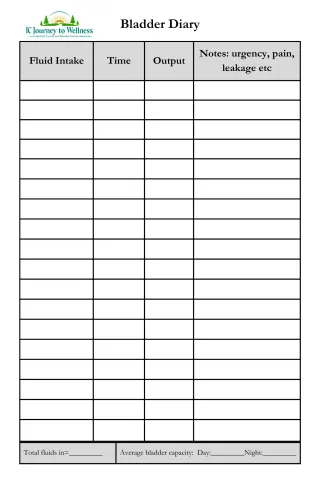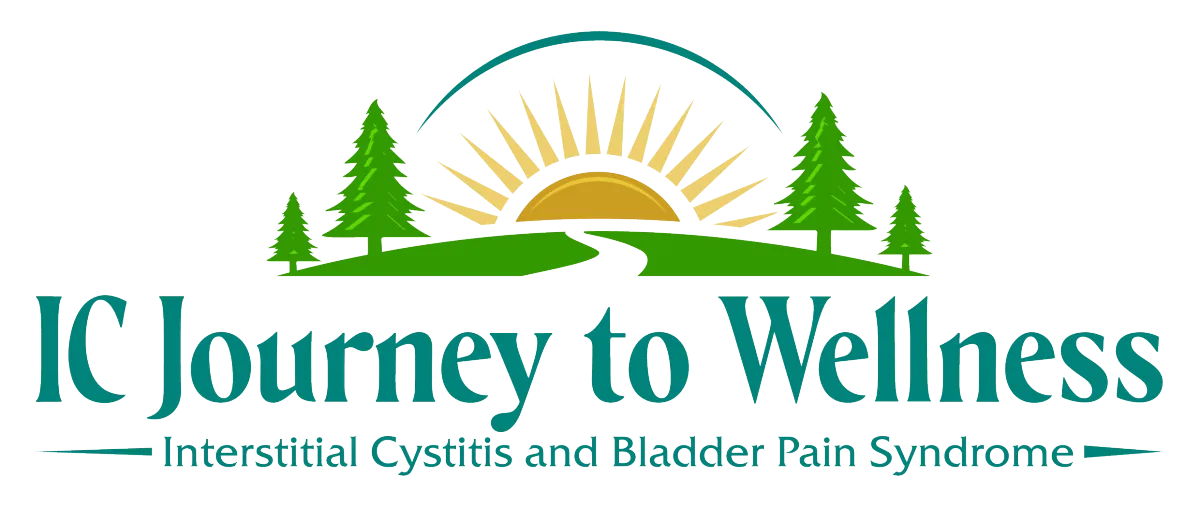Resources
Tools to help you on your journey
Questionnaires to help monitor your progress and to help screen for associated conditions
Additional Resources
Interstitial Cystitis Symptom Index and the Interstitial Cystitis Problem Index (ICSI/ICPI)
Also known as the O’Leary-Sant IC Questionnaire. This questionnaire is appropriate for men and women. It measures urinary and pain symptoms and assesses how problematic symptoms are for patients with Interstitial Cystitis. This is an excellent questionnaire to use to help track your symptoms. Record your scores and then reassess after a few months to see if the score has lowered, indicating improvement.
Click here for the ICSI/ICPI questionnaire
O'Leary MP, Sant GR, Fowler FJ Jr., Whitmore KE, Spolarich-Kroll J: The interstitial cystitis symptom index and problem index. Urology1997 May; 49(5A Suppl): 58-63.
Pain Urgency Frequency (PUF) questionnaire
This is an eight-question survey, appropriate for men and women, that assesses urinary and sexual function, as well as pain response. This questionnaire, developed by C. Lowell Parsons, MD, is useful in screening patients with chronic pelvic pain. Not only does the survey assess symptoms, but it also measures how bothersome those symptoms are. Scores range from 0-35, and the questionnaire only takes five minutes to complete. A score greater than 12-13 should suggest consideration of a diagnosis of IC/BPS. The score for those with a diagnosis of IC/BPS can be followed to assess symptoms over time.
Click here for PUF questionnaire
Parsons CL, Dell J, Stanford EJ, et al: Increased prevalence of interstitial cystitis: previously unrecognized urologic and gynecologic cases identified using a new symptom questionnaire and intravesical potassium sensitivity. Urology 2002 Oct; 60(4): 573-8.
Queensland Pelvic Floor questionnaire
This survey is appropriate for women and assesses pelvic function. Subsections assess bladder function, bowel function, prolapse symptoms, and sexual function.
Click here for Queensland Pelvic Floor questionnaire
Baessler K, O'Neill SM, Maher CF, et al: A validated self-administered female pelvic floor questionnaire. Int Urogynecol J. 2010 Feb; 21(2): 163-72.
International Prostate Symptom Score (IPSS)
The AUA symptom index was developed to help assess for obstruction in men. It has seven questions covering frequency, nocturia, weak urinary stream, hesitancy, intermittent urination, incomplete emptying, and urgency. The IPSS uses the AUA symptom index and has been adopted internationally as the tool to help screen for lower urinary tract symptoms that can indicate obstruction. The IPSS includes a quality-of-life question that helps to indicate how bothersome the urinary symptoms are to you. We also use this questionnaire in women that have symptoms of obstruction or a slow stream. If you have symptoms of obstruction, the IPSS score can be followed to check for progression of symptoms or improvement. Symptoms are mild if the score is seven or less, moderate if the score is 8-19, and symptoms are severe if the score is 20-35.
Click here for IPSS questionnaire
Barry MJ, Fowler FJ Jr, O'Leary MP, et al: The American Urological Association symptom index for benign prostatic hyperplasia. J Urol. 1992 Nov; 148(5): 1549-57.
National Institute of Health (NIH), Female Genitourinary Pain Index (F-GUPI)
Questionnaire for women that assesses IC/BPS symptoms, severity, and impact on quality of life. This is a modification of the NIH Chronic Prostatitis Symptom Index, adjusted for women. This is another tool to monitor symptoms over time.
Click here for F-GUPI questionairre
Clemens JQ, Calhoun EA, Litwin MS, et al: Urologic pelvic pain collaborative research network. Validation of a modified National Institutes of Health chronic prostatitis symptom index to assess genitourinary pain in both men and women. Urology 2009 Nov; 74(5): 983-7.
National Institute of Health (NIH), Male Genitourinary Pain Index (M-GUPI)
Questionnaire for men that assesses pain, urinary symptoms, and quality-of-life impact of chronic prostatitis, IC/BPS. This tool for men with pelvic pain can be used to measure symptoms over time.
Central Sensitization Inventory (CSI)
This inventory is appropriate for men and women and is used to assess for symptoms of central sensitization syndrome and for other chronic pain conditions that may be seen in the brain-processing phenotype. A score of 40 or higher on part A should raise the question of a diagnosis of central sensitization syndrome.
Neblett R, Cohen H, Choi Y, et al: The central sensitization inventory (CSI): establishing clinically significant values for identifying central sensitivity syndromes in an outpatient chronic pain sample. J. Pain 2013 May; 14(5): 438-45.
Bladder Diary
Use the bladder diary to measure your frequency of urination, both day and night. By measuring the volume you urinate you can calculate your average bladder capacity for both daytime and night. This information can be used to track improvements over time, and may be a helpful clue, when determining what phenotype or phenotypes of IC/BPS you have.

Books
Books on Interstitial Cystitis and Bladder Pain Syndrome:
IC 101, by Gaye Grissom Sandler, Jill Heidi Osborne, MA, and Andrew B Sandler PhD (2021)
- Published in 2021, this is an up-to-date look at IC/BPS, with excellent self-help ideas and resources. IC 101 introduces the concept of phenotyping IC/BPS.
The Interstitial Cystitis Solution: A Holistic Plan for Healing Painful Symptoms, Resolving Bladder and Pelvic Floor Dysfunction, and Taking Back your Life, by Nicole Cozean and Jesse Cozean (2016)
- Covers topics such as diet and nutrition, natural supplements, stress management, pelvic floor exercises, and excellent stretching routines.
You Are Not Your Pain: Using Mindfulness to Relieve Pain, Reduce Stress, and Restore Well-Being—an Eight-week Program, by Vidyamala Burch and Danny Penman (2015)
-This book offers an eight-week mindfulness-based program with eight audio meditations. These mindfulness-based practices soothe the brain’s network.
Secret Suffering: How Women’s Sexual and Pelvic Pain Affects Their Relationships, by Susan Bilheimer and Dr. Robert J. Echenbert (2019)
-Written by a gynecologist and leader in pelvic pain, this book discusses chronic pelvic and sexual pain, providing a blueprint for regaining intimacy in your relationships and managing chronic pelvic pain.
The Trigger Point Therapy Workbook—Your Self-Treatment Guide for Pain Relief by Clair Davies, NCTMB, and Amber Davies, NCTMB, LMT, et al. (2013)
-Excellent resource for those with muscle/myofascial phenotype
The Interstitial Cystitis Survival Guide, by Robert M. Moldwin, M.D., FACS (2000)
-Although published in 2000, still has excellent self-help advice that is pertinent today.
Interstitial Cystitis and Pain—Taking Control—A Handbook for People with IC and Their Caregivers, Published by the Interstitial Cystitis Association (2004)
-This book explores the many aspects of IC pain and offers suggestions for relief.
Breaking Through Chronic Pelvic Pain: A Holistic Approach to Relief, by Dr. Jerome Weiss (2019)
-This book describes a holistic approach to treating pelvic pain. It is especially helpful for muscle/myofascial phenotypes.
Facing Pelvic Pain, A Guide for Patients and Their Families, by Elise J.B. De, M.D. and Theodore Stern, M.D. (2020)
-Written by leading experts at Massachusetts General Hospital, it covers many overlapping chronic pain conditions. Has excellent pictures and diagrams as well as a treatment map that allows you to organize all pertinent information in an organized format.
When It Hurts Down There: 15 Proven Techniques to Alleviate Pelvic Pain, by Dr. Angie Stoehr (2018)
-Written by a gynecologist, focuses on pelvic and sexual pain with a comprehensive approach to diagnosing and treating. Covers many causes of pelvic pain in women, besides IC/BPS.
Diet
A taste of the Good Life: A Cookbook for an IC Diet, by Beverley Laumann (1998)
The IC Chef Cookbook, More Than 260 Bladder-Friendly Recipes Shared by Patients Just like You, by Jill H. Osborne, MA (2015)
Confident Choices: Customizing the IC Diet, by Julie Beyer, MA, RD (2010) - This book outlines how to customize the IC diet to help meet your individual needs. Helps to guide you with an elimination diet.
Confident Choices: A Cookbook for IC and OAB, by Julie Beyer MA, RD (2008)
-Includes over 200 recipes for those with a fussy bladder, whether it is from IC or OAB.
IC-Friendly Summer Eats, by Callie Krajcir, Beverly Levesque, and Kerrie Cole (Sept. 2022)
-Contains over 50 summer recipes. Written by two IC nutritionists and an IC warrior.
Websites
Interstitial Cystitis Association: www.ichelp.org
IC Network: www.ic-network.com
Both organizations above have up-to-date resources for patients with IC/BPS, including lists of providers that care for patients, diet information, support group listings, and much more. If you have not yet checked them out, I highly recommend it!
Additional Online Resources:
International Pelvic Pain Society- www.pelvicpain.org
American Urologic Association (AUA)- www.urologyhealth.org International Painful Bladder Foundation- www.painful-bladder.org European Society for the Study of BPS- www.essic.org
National Kidney and Urologic Diseases (NIDDK)-
Multidisciplinary Approach to the Study of Chronic Pelvic Pain-
The IC Diet Project: Low-Acid Eating Made Simple- www.icdietproject.com
Apps
Apps to Help You on Your Journey
Bladder Tracker®: This is a free app developed by the IC Network and Natural Approach Nutrition. It tracks symptoms, pain levels, diet, hydration, and sleep quality.
Bladder Pal®: This app lets you track how much you drink, how often you go to the bathroom, and whether you had leakage. The AUA symptom questionnaire is also on the app.
Headspace®: This is an everyday mindfulness and meditation app with great reviews.
Calm®: is an app for both mindfulness and to help with sleep.
Curable®: is an app and healing program that provides patients with evidence-based techniques for chronic pain self-care. This includes cognitive-behavioral therapy, pain reprocessing therapy, guided meditations, visualization, pain science education, and much more. If you would like a six-week free trial, click on the button below. There are many more apps available that can be helpful as you plan your journey to wellness.
What they are saying about me or my book
The following are some Amazon book reviews and Google reviews from past patients. Make sure you submit a book review as well! You can go here to leave a review of the book, IC Journey to Wellness.

Ann H.

Readable and well organized with useful info based on the latest Interstitial Cystitis/BPS research. Finally a book with NEW information backed up by recent scientific research that’s genuinely useful for people diagnosed with Interstitial Cystitis or Bladder Pain Syndrome. I found it empowering and aptly named; it certainly provided me with fresh hope for my journey to wellness.
I was diagnosed with IC 25 years ago and have been down the road of “throw all the treatments against the wall and see what sticks” which was time consuming (talking years here) and only occasionally helpful. This readable and well-organized book clearly explains a new approach of grouping IC/BPS into smaller subgroups (called phenotypes) based on specific symptoms. This kind of grouping allows for more individualized treatments for people suffering with these chronic illnesses.
Dr. Peters includes easy to understand descriptions of each phenotype as well as concise “roadmaps” offering practical tips and possible treatment options for each. Reading the descriptions provided me with clues as to which phenotypes (most people have more than one) I might fall into. These “clues” are hands down the most useful information I’ve gotten about IC since being diagnosed. I understand now why some treatments just didn’t work for me. And I got ideas about what I might try going forward which felt like a breath of fresh air.
Best of all, this is a book you can take to your provider to initiate new conversations about treatment options. Urologists who are unaware of this research will be grateful for the info..
Reviewed in the United States on February 9, 2024. Verified Purchase

Sharon F.

Great resource from an expert in the field! This is a clear and straightforward read. The current research is laid out in clear, well-defined paths for both medical professionals and lay people alike. The information provided offers promising outcomes and hope, to anyone suffering from this syndrome. An easy read that is highly recommended.
Reviewed in the United States on February 7, 2024. Verified Purchase

adc

Comprehensive resource for bladder pain. Doing research for a family member with some recent bladder pain, I found this book right at the top of the Amazon charts. There's a wealth of technical detail, which I appreciated, and it never overwhelms. Whenever I've had to deal with a medical condition, it puts my mind at ease to have a comprehensive source of quality information. Usually I have more questions than my doctor has time to answer.
In addition to providing expert knowledge about subtypes, causes and treatments, the author includes relatable stories of patients' experiences, practical advice for IC sufferers, and helpful "DIY" materials at the end like a bladder diary.
I was surprised to discover from my family member, a few weeks after their receipt of the book, that they had a friend of a friend who was once a patient of the author, Dr. Peters-Gee. My understanding is that for some time Dr. Peters-Gee was the only urologist in her region who would even accept patients with bladder pain syndrome, because the symptoms can be such a puzzle for clinicians to understand and treat. The doctor's years of experience caring for people with IC/BPS are evident throughout the book.
Reviewed in the United States on April 11, 2024.
Verified Purchase

Sandra P.

Easy to read and comprehend. Very informative. IC Journey to Wellness is an excellent guideline for providers and lay persons. Each chapter breaks down symptoms of IC/BPS in a way that provides an individual information that can help guide their care. This book is extremely helpful for providers. It navigates through different systems that can cause IC/BPS symptoms and provide medical based/supported research recommendations for treatment.
Reviewed in the United States on April 4, 2024

Lenore I.

Dr. Peters-Gee is an excellent physician.
She focuses on what is presented to her in a supportive and conscientious manner that has always been helpful. I have always felt confident that she would do what is in my best interest and she is excellent at diagnosing, listening, treating and caring. She is a true professional.

Jamie M.

Dr. Peters saved my life and gave me hope when I lost faith in most doctors. She's one of the kindest doctors I've ever met. She's very empathetic, incredibly knowledgeable in urology and Interstitial Cystitis, and just an overall amazing woman. Her practice is one of the only offices in CT that has clinical trials for IC and she's always willing to do additional research to help her patients. I would not be here without her and I'm very grateful our paths crossed. I highly recommend Dr. Peters without any reservation.

Pricilla M.

I am pleased with Dr. Peters because she is so knowledgeable. I trust her. IC is a difficult ailment to treat and now the best rx for it can cause serious side effects. I feel Dr. Peters will give me suggestions to deal with the discomfort I have and keep trying until we get it right. She is very compassionate.

Sandra S.

I adore Dr. Peters. She’s helped me so much and is always suggesting new things for my IC. She takes her time with me by always listening to and answering any questions. She is a fantastic and very knowledgeable, compassionate doctor.




